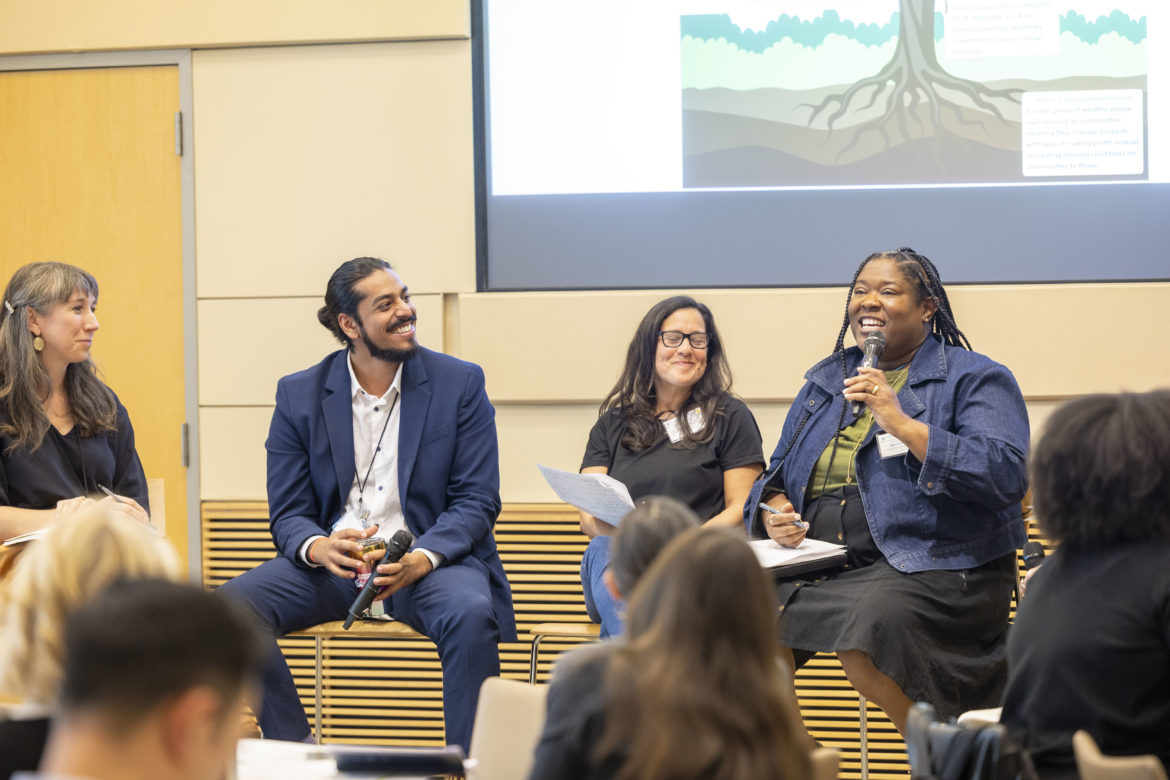
CA Housing Justice Convening: Breaking Silos to Show Up for California’s Communities
APRIL 25, 2024
Foundations came together across issue areas and geography to learn from leaders on the frontlines of housing justice about their priorities and how philanthropy can show up.
“We cannot service our way out of this crisis. If we could solve it through policy we would. If we could solve it through services we would. But, we build power through the exercise of power.”
Alexandra Suh, Koreatown Immigrant Workers Alliance
The Fund for an Inclusive California has deep and longstanding relationships with community organizations across the state. In fact, our partners designed our current five-year strategic approach and are co-governing the way we implement this phase.
In our experience, the real magic and possibility of our work happens when we listen to field leaders’ insights firsthand, learning about their needs and the dynamic landscape they navigate. Instead of checking a box for community input, we focus on building reciprocal relationships, and creating spaces for genuine sharing that helps align funding to the real on-the-ground priorities for California’s communities of color.
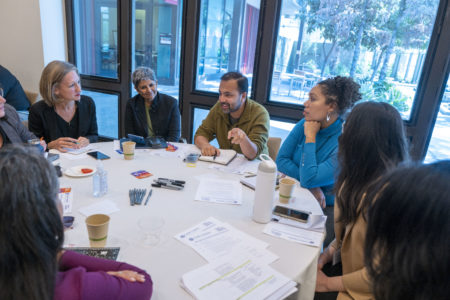

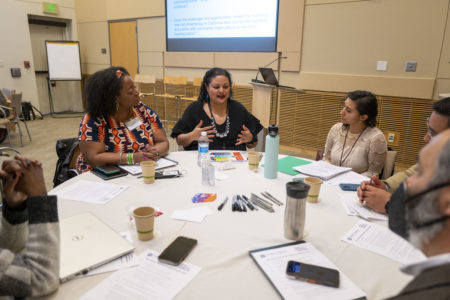


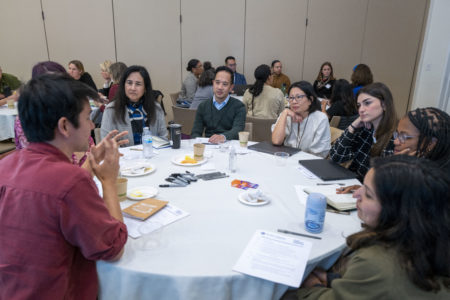
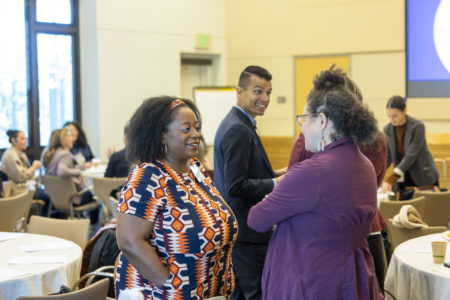
A Gathering To Break Silos and Spotlight Possibility
“The truth is whether you are a funder in the education space, health, immigrant rights, environmental justice, worker rights – any funder in California knows you can’t talk about addressing systemic issues without understanding the connections to housing justice and vice versa.”
Jazmin Segura, Director of Strategic Initiatives, Housing Justice, Common Counsel Foundation
On February 13, Common Counsel Foundation in collaboration with the California Housing and Homelessness Policy Funders Network, held the California Housing Justice Philanthropic Convening. The event drew over 80 participants from various foundations and philanthropy-serving organizations, alongside 15 representatives from power-building and community ownership entities statewide. It served as a call to action for funders to engage more actively in this critical work.
This gathering marked one of the first times in recent memory that California-based and national funders convened with power-building and movement-based organizations across California to update conditions and initiatives in communities throughout the state.
It aimed to update funders on community conditions and initiatives, fostering a shared understanding of decommodification, housing preservation, and combating the outsized influence of the speculative market. The event provided a platform for funders to expand their knowledge and engage in meaningful dialogue with organizations striving for a thriving and livable California.
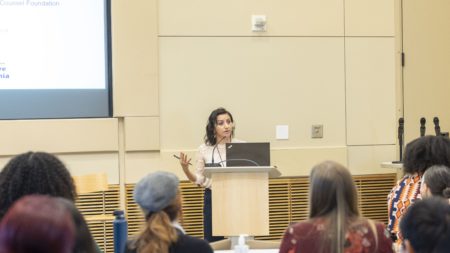
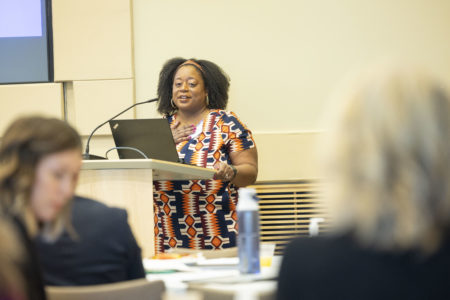
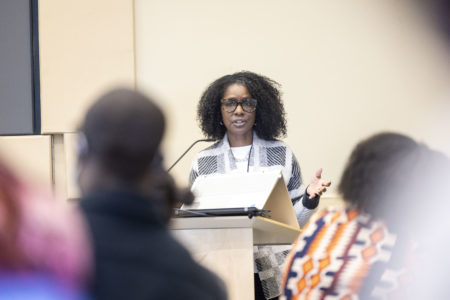
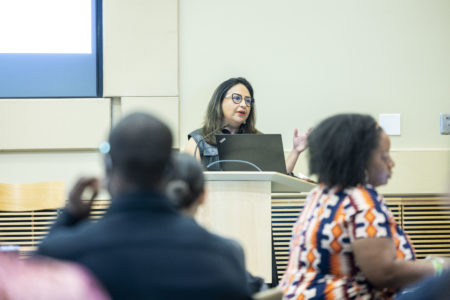
Broadening Perspectives, Learning New Approaches
One of the unique opportunities that is possible through the Fund for an Inclusive California, because of our longstanding relationships with organizations, is hearing directly from leaders in the field. This allows us to gain a deeper understanding of their needs and the forces at play.
The convening was an opportunity to come together with the extensive Funders Together to End Homelessness network to platform our community partners’ perspectives and go beyond usual approaches that foundations may take to approach housing. We created spaces for peers in the sector to explore new possibilities and widen the aperture of what is needed from philanthropy in the fight for housing justice.
The convening was also an intentional effort to expand the scope, definition and understanding of housing justice to provide a wider runway and multiple access points for funders that don’t necessarily see their programs or priorities as housing justice-specific.
The day offered a wide variety of approaches and perspectives. Sessions delved into the intersections of housing with immigrant rights and climate justice, offering fresh insights and strategies. In the de-commodification session, leaders highlighted challenges of being out-organized and outspent by real estate corporations and the speculative market. They emphasized that merely providing services will not resolve the crisis; true solutions come from policy change and building power through collective action. Something that came through across panels and discussions: Funders can embrace the frame “housing justice,” placing greater emphasis on people power rather than only the production of more units.
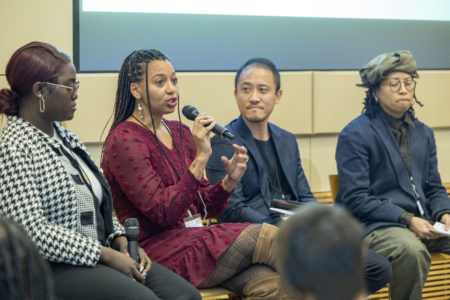
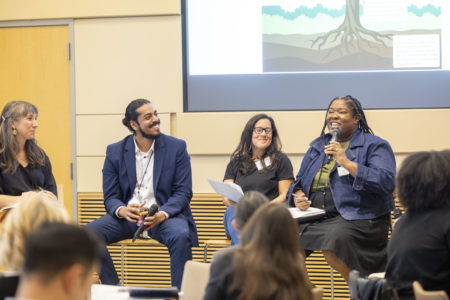
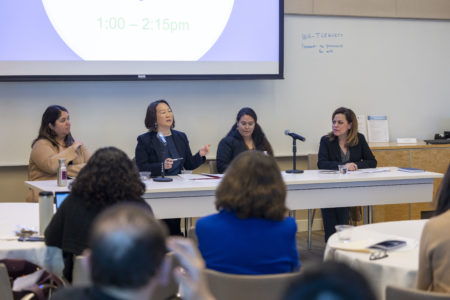
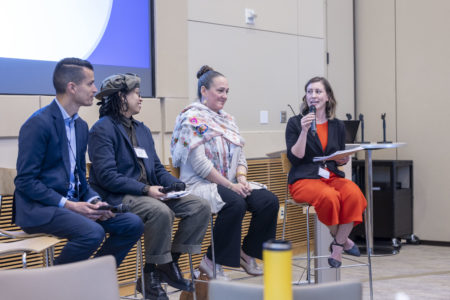
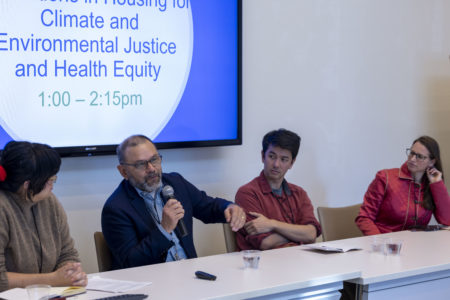
Heard at the Convening
“Today’s conversation was remarkably different from sessions we’ve held in the past. Particularly because of how movement leaders were centered today. There is a clear articulation about the vision for what we want, not just what we’re fighting against.” – Rajib Guha, The James Irvine Foundation
“We have no choice but to meet community needs. What is needed is people and funders who are not afraid to understand all the intersections. We need unrestricted support so that organizations can meet the needs.” – Jewel Patterson, Congregations Organized for Prophetic Engagement
“Navigating pushback after housing advocates win. The clapback is real. Elected officials are typically not renters, and therefore, that perspective is missing in the legislature. We need to toxify the relationship between legislatures and real estate. When we see the real estate lobby ally with police, this needs to be amplified.” – Christina Livingston, ACCE Institute
“C4 funding is crucial. Invest in places like the Central Valley and Inland Empire without divesting from coastal cities. Invest in all of these because the rules are different in all areas.” – Saa’un Bell, Power California
“We need more in-depth solutions for complex problems. If it feels familiar it is not a solution.” – Chris Ko, United Way of Greater Los Angeles
“Invest in the life cycles of movements. Not 1-2 year stints.” – Carla de Paz, Community Power Collective
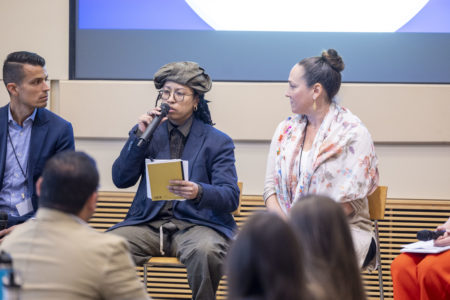
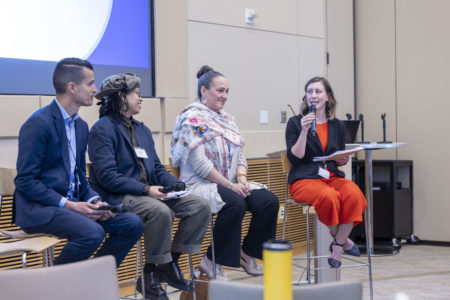
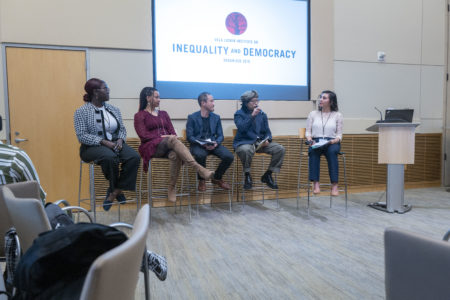
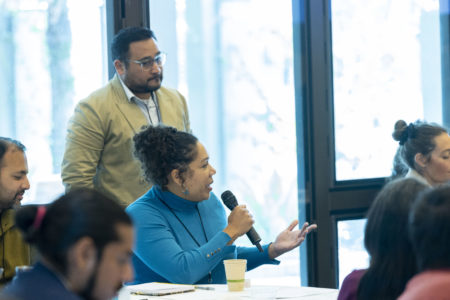
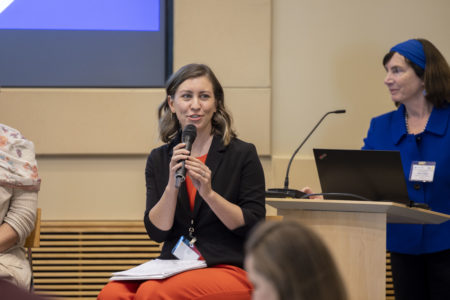
Takeaways from the Sessions
The sessions were full of information, stories and perspectives from community leaders and funders who are in the thick of these efforts. We gathered these takeaways from the day:
- We are at a critical juncture. Funders must invest in housing justice individually as well as work collaboratively with other funders to amplify the impact of organizers working at various levels.
- Organizing efforts are becoming more sophisticated and robust, gaining momentum towards greater efficacy. Amidst rampant real estate speculation, innovative solutions and models are being developed.
- It is crucial to organize and establish a strong foundation statewide, forming coalitions at local, regional, and statewide levels while securing funding. Centered around BIPOC and intergenerational communities, the increasingly powerful movement is often underfunded and underestimated in terms of needs and potential.
- Recognizing the scale and potential impact, both the public and philanthropic sectors must acknowledge this as a collective responsibility. There is a necessity not only to invest individually but also to align our investments collaboratively as funders to amplify the impact of organizers working at various levels.
As funders, we’re being challenged to rethink our approach. The energy at this gathering was invigorating, with many expressing eagerness to explore, learn, and grow together. There was a real excitement about embracing what’s possible, redefining our roles as funders, and unlearning outdated practices to support real progress in our work and organizations.
A few foundations shared reflections about how they are approaching housing justice work:
- The James Irvine Foundation shared that the many of this gathering’s speakers are grantees of Irvine Foundation, but they are in different portfolios. The foundation is taking an effort to learn across silos.
- Northern California Grantmakers (NCG) is thinking about how to connect the dots across housing, criminal justice, and more. What connects the dots is power building. Unrestricted dollars, go bigger are resonant themes. That’s what’s doing it differently. NCG’s goal is to underscore this.
- Blue Shield of California Foundation places an emphasis on housing justice for survivors. Blue Shield supports organizations and coalition partners. There is a need to increase resources for organizations, to give deeper, especially if they are leading coalitions.
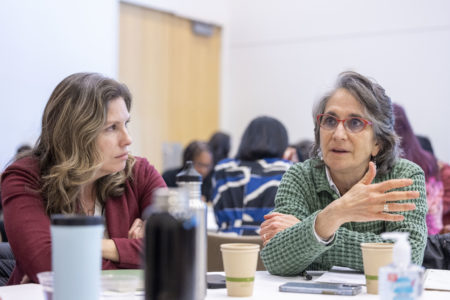
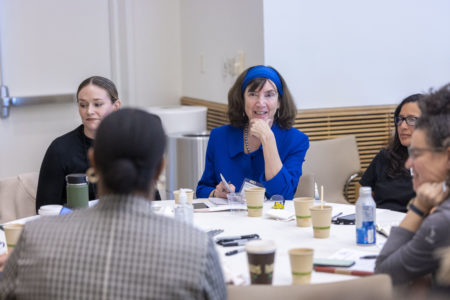
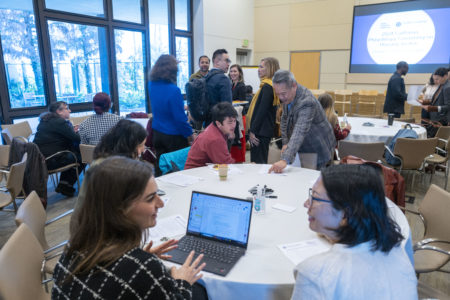
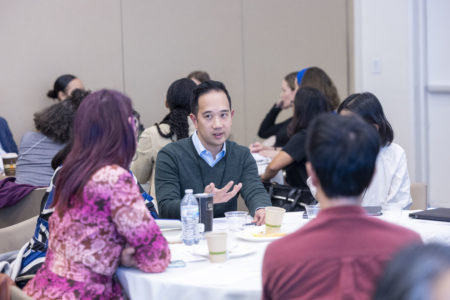
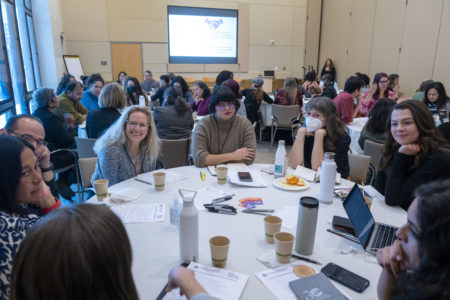
What we heard from attendees: Reflections, curiosity, and commitment to action
The excitement in the room was palpable, and we were thrilled to learn through feedback surveys that attendees were soaking in the insights from community leaders, gaining fresh perspectives on housing justice and its relevance to their efforts. The funder attendees share that they found inspiration and actionable ideas to bring to their work and institutions.
These are a few of the ways funders who attended shared they were committed to action and taking information back to their institutions:
- Strategic Engagement and Education: Presenting housing justice topics to donors, engaging with Community Land Trusts, and integrating housing justice into conference programming. Hosting learning sessions about important legislation like ACA 1 for institutional funders and grantmakers.
- Funding and Support for Housing Initiatives: Backing Amendment ACA 1, working with local funding bodies, funding narrative communication strategies, and recognizing the importance of multi-year investments in narrative and power-building campaigns.
- Partnership and Community Building: Building relationships with new partners and stakeholders, connecting various investment areas, and engaging in more funder organizing within institutions and across the sector.
- Research and Policy Advocacy: Researching housing justice convenings, exploring land trust decommodification, identifying regional corporate holdings and rental vulnerabilities, and integrating housing discussions into policy priorities.
Lingering questions and areas for more learning
While the day was packed with information, there is so much more that funders are eager to learn about. We heard from participants that these are areas for more discussion and collaboration:
- Align funders’ mission and goals effectively.
- Explore new partnership opportunities for broader impact.
- Address housing justice issues in the region comprehensively.
- Navigate tensions between traditional and innovative solutions.
- Enhance grantmakers’ organizing capacity for resource mobilization.
- Prepare for potential CA Business RT measure and corporate landlord pressure.
Finally, we heard from funders that they are interested in learning more and want to explore these approaches to be better advocates and allies for housing justice efforts:
- Strengthening multi-sector alliances for housing justice
- Cultivating a culture of landback reparations
- Identifying funders interested in community-driven affordable housing solutions
- Strategies for acquiring property in land trusts
- Making Community Land Trusts (CLTs) more sustainable and impactful
- Best practices and shared resources for housing justice initiatives
- Technical assistance in policy advocacy and securing funding
- Decommodifying housing – Practical steps to implement this concept
- Peer-to-peer discussions and networking opportunities
- Longer opportunities for funders to share insights and grant highlights on housing justice
Advancing Housing Justice as an Intersectional Issue
Centering People and Their Right to Home
The definition of housing justice that the Fund for an Inclusive California is working toward comes from the collection of efforts and definitions of our Community Advisors. They define housing justice as intersectional, centering people and their self-determination, the right to a home, and having an analysis around the causes of the housing crisis as well as solutions that incorporate structural racism and the role of a market-driven housing sector.
We are eager and committed to continue toward this vision, following the lead of our community partners, and providing a space and path for others to learn, join and pick up the mantle of housing justice in their institutions, for the communities you serve.
Stay tuned for upcoming opportunities to engage in learning, funding and advocating for housing justice. We’re planning more gatherings and opportunities for the months ahead.
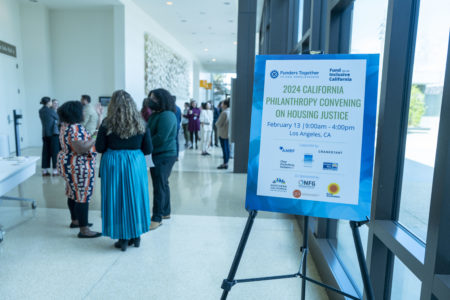
About Fund for an Inclusive California
The Fund for an Inclusive California advances racial and economic equity by supporting power building of communities of color. The Fund is a program of Common Counsel Foundation. Since 2017, we have aligned funders to support an ecosystem of housing justice efforts led by communities across California, making $13 million in grants. The community partners are organizing to protect tenants, preserve and produce affordable housing for low and extremely low-income residents, and advancing equitable development policies that prioritize the long-term well-being of all Californians. Learn more at F4ICA.CommonCounsel.org.
About Common Counsel Foundation
Common Counsel Foundation has more than 35 years practicing progressive philanthropy, funding grassroots social movements and centering the leadership of communities that have historically been marginalized by intersecting systems of oppression. We partner with families and individual donors and are home to multi-funder collaborative initiatives, all with the goal to expand philanthropic resources for progressive social movements. In 2023, Common Counsel directed nearly $48 million in grants to community-led organizations. Learn more at www.commoncounsel.org.
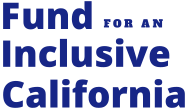
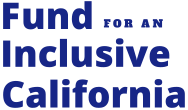
Los Angeles Impact Brief: Advancing a Shared Vision for Housing Justice
Announcing the New Blended Field Leader-Funder Governance to Guide Fund for an Inclusive California’s Next Phase
Inside Philanthropy: With a Power-Building Approach to Housing in California, a Pooled Fund Evolves and Expands